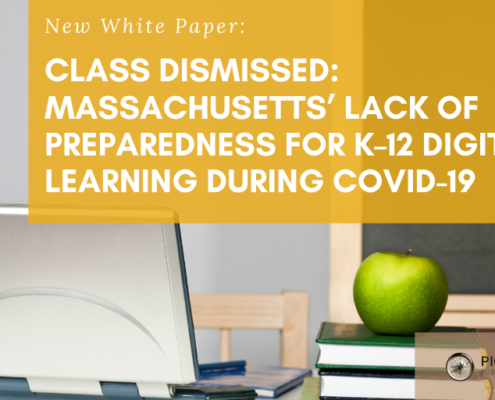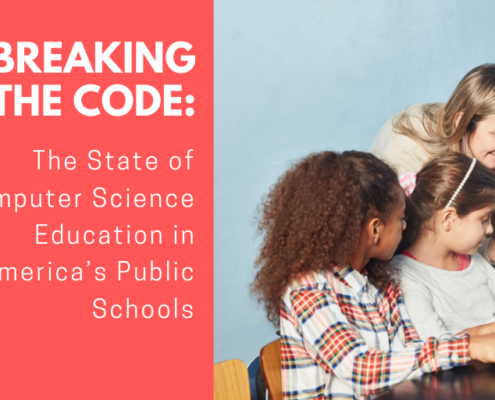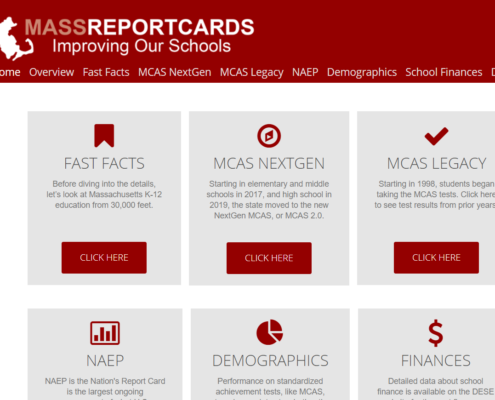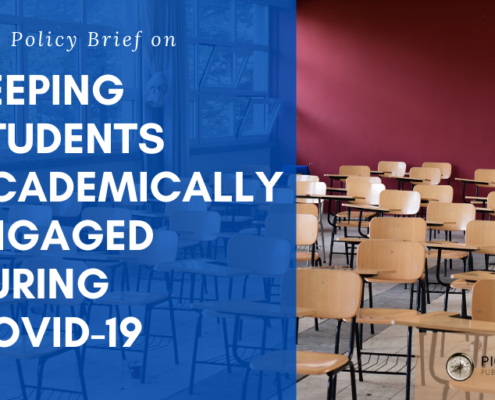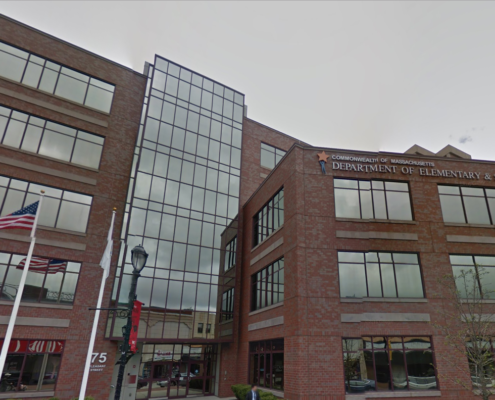Study Calls for Tying Additional State Education Aid to Reforms
Narrowing funding gap between high-income and less affluent districts should be focus of school funding formula update
Contact Jamie Gass at jgass@pioneerinstitute.org
Read coverage of this report in The Boston Globe and the Springfield Republican.
BOSTON – Efforts to update the Commonwealth’s K-12 education funding formula should focus on narrowing the gap between affluent and low-income school districts and be accompanied by reforms designed to improve student outcomes and enhance accountability, according to a new study published by Pioneer Institute.
“Tying new money to high standards and accountability was the grand bargain at the heart of the Commonwealth’s successful 1993 Education Reform Act,” said Jamie Gass, director of Pioneer’s Center for School Reform, who co-authored “The Next Chapter of Education Funding in Massachusetts” with Gregory Sullivan and Charles Chieppo. “Policymakers should not forget that important lesson.”
Beginning in 1993, the Commonwealth’s SAT scores rose for 13 consecutive years. State scores on the National Assessment of Educational Progress (NAEP) shot up, too. By 2005, Massachusetts students became the first to score best in the nation in all four major NAEP categories (fourth- and eighth-grade reading and math).
While American students as a whole lag behind their international peers, 2007 and 2011 Trends in International Mathematics and Science Study results showed that Massachusetts students were competitive with their counterparts in places like Japan, South Korea and Singapore. In 2007, Bay State eighth graders even tied for first place internationally in science.
Over the last decade, Massachusetts has retreated from key reforms that drove gains in student achievement. The Commonwealth has adopted weaker academic standards in English, math, science and history, transitioned to the watered-down MCAS 2.0, eliminated an independent district accountability agency, and seen legislative support for proven innovations like charter public schools erode.
As a result, state SAT and MCAS scores have declined, and Massachusetts is among a minority of states in which NAEP scores fell between 2011 and 2017.
Among the authors’ recommendations are new models for underperforming and the lowest-performing school districts, reconstituting an independent school district audit function and funding an MCAS graduation requirement in U.S. history, as was included in the 1993 Education Reform Act.
The authors also call for investing in effective urban school models by fully funding district charter school reimbursements and making funding for charter school facilities more equitable. They urge more funding for METCO and regional vocational-technical high schools, along with expanding those programs if possible.
Funding
From 1993 to 2019, state aid to schools (known as Chapter 70 funding) jumped by over 227 percent. During the same period, school spending by municipalities rose by about 157 percent, while the consumer price index for Boston-Cambridge-Newton increased by around 84 percent and statewide public-school enrollment went up about 16 percent.
Today, Massachusetts ranks eighth among the states and Washington, D.C. in total per-pupil spending. The Commonwealth is fourth among the states in per-pupil funding from local sources and 11th in state support.
The study finds that the generally accepted narrative that the Chapter 70 funding formula hasn’t changed in over 25 years is not true. In fiscal 2007, important changes were made in the way the Commonwealth determines a municipality’s ability to contribute to its education costs. We are currently in the midst of a seven-year phase-in of a plan to more accurately reflect school district health insurance costs.
The area in which the formula has failed to keep up is seen in the growing gap between high-income and less affluent school districts. The evidence is clear that progressive funding is effective, especially given that low-income students are generally more expensive to educate.
While high-income districts often receive between $1,500 and $4,000 annually in per-pupil state aid, compared to $10,000 to $12,000 for the lowest-income districts, large property tax bases allow high-income districts to provide generous local funding. In 2018, for example, Cambridge contributed $25,920 per pupil.
Low-income districts provide far less from local funds. For example, Lawrence provided $1,563 per pupil and Springfield $2,403 in local funds per pupil in 2018. The net result is that while lower income communities receive disproportionately higher state aid, their total per-pupil funding is far less than that of higher-income communities. Lawrence’s total 2018 per-pupil spending was $14,899, while Cambridge’s was $29,478.
As lawmakers seek to address these funding gaps, they should keep in mind the enormous parallel funding challenges they will face in coming years. For example, the Commonwealth is responsible for the unfunded liability of the Massachusetts and Boston Teachers Retirement Systems. Taken together, these systems account for nearly two thirds of the state’s overall $41.66 billion unfunded pension liability. The unfunded liability for the two systems increased at an annualized rate of nearly 12.5 percent between 2000 and 2018.
To make matters worse, funding schedules to pay down the unfunded liability are invariably backloaded more and more over time, which puts off addressing the problem. “The most recent schedule calls for the Commonwealth to contribute nearly $7 billion in fiscal 2036, which is clearly unrealistic,” Sullivan said.
The authors conclude that the goal of making state education funding more equitable by increasing aid to low-income districts can be achieved through increases such as those proposed by Gov. Baker, who would raise Chapter 70 aid by about $1.25 billion, or about 21 percent, by fiscal 2026. Proposals such as the Promise Act, which would add about twice as much over seven years, would add more than is needed to effectively update the formula.
About the Authors:
Gregory Sullivan is Pioneer’s Research Director, and oversees PioneerPublic and PioneerOpportunity. Prior to joining Pioneer, Sullivan served two five-year terms as Inspector General of the Commonwealth of Massachusetts.
Charles Chieppo is a senior fellow at Pioneer Institute and the principal of Chieppo Strategies LLC, a public policy writing and communication firm.
Jamie Gass is Pioneer Institute’s Director of the Center for School Reform.
About Pioneer:
Pioneer Institute is an independent, non-partisan, privately funded research organization that seeks to improve the quality of life in Massachusetts through civic discourse and intellectually rigorous, data-driven public policy solutions based on free market principles, individual liberty and responsibility, and the ideal of effective, limited and accountable government.
View more information, including an interactive map and data tables on Chapter 70 funding.











